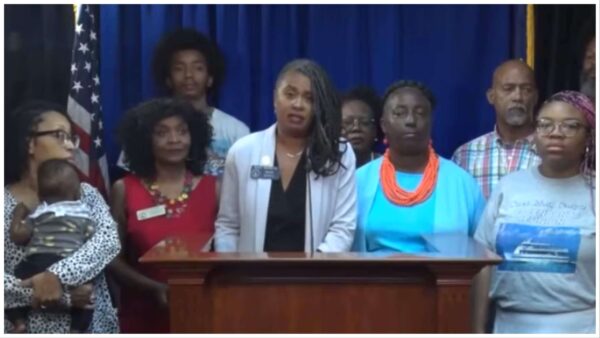A county commission in rural Georgia is asking a judge to throw out a lawsuit challenging zoning changes in one of Black America’s most treasured former enslaved communities in the rural South.
The legal action, filed in October on behalf of a group of Black residents in the Hogg Hammock community on a Georgia barrier island — descendants of enslaved persons among them — challenges local zoning changes that put pressure on them to sell their homes on an island that houses one of the last surviving Gullah-Geechee communities along the U.S. southeast.
The suit came in response to a decision by McIntosh County commissioners to relax zoning restrictions that, until then, had prohibited development on the island where dirt roads and quaint homes have come to define the region’s cultural and historical roots.

The Nov. 20 counteraction filed in a Superior Court in Savannah by the McIntosh board adds another layer to the ongoing legal drama with Black landowners in Hogg Hammock, a poor and secluded coastal community nestled in the wetlands of Georgia’s Sapelo Island.
Attorneys with the Southern Poverty Law Center represent dozens of Gullah residents in Hogg Hammock, a small island town about 60 miles south of Savannah, founded by former enslaved people who worked the plantation of Thomas Spalding in the years before the Civil War.
The community, which is listed on the National Register of Historic Places, sits on hundreds of acres in the south-central area of Sapelo Island, according to the Sapelo Island Cultural and Revitalization Society.
The entire island, which covers 16,500 acres of McIntosh County, is the fourth-largest in Georgia. The majority of the island is owned and managed by the state, except for Hogg Hammock, which remains an unincorporated district of McIntosh County.
Hogg Hammock is reachable only by boat, while greater Sapelo Island — where the obscure town is situated — is largely owned by the state of Georgia.
Most of the surrounding land on the island has been designated as a state and national wildlife preserve, while the old zoning restrictions were put in place nearly 30 years ago to help Hogg Hammock residents retain their land in spite of new tax laws.
About 65 percent of McIntosh County’s 110,000 residents are white, while the small enclave of Hogg Hammock has only about 50 residents who are all Black and the descendants of generations of slaves dating back to the early 1800s.
Beginning in 2013, native populations on the island started to see record-breaking tax hikes as mainlanders moved in and built vacation homes.
The Geechee community’s latest legal action also comes after a 2015 lawsuit that accused the state and McIntosh County of neglect, unfair taxation and violation of civil rights due to deficiencies in fundamental public resources, such as fire and police services, as well as inadequate ferry transportation between the island and the mainland.
As a result, the state of Georgia agreed to improve the docks and passenger service in 2020, while the McIntosh Commission settled the discrimination suit in August 2022 for $2 million.
The descendants of the historic encampment, along with others in the sea island chain, are referred to as Gullah or Geechee, while their prolonged isolation from the mainland United States allowed them to preserve a significant portion of their original African heritage.
A small number of Gullah populations still thrive in coastal regions in pockets of Georgia, North Carolina, South Carolina and northeastern Florida.
However, at one time, Geechee descendants reportedly owned 2,000 acres of the island’s 18,000 total acres.
A hearing on the county’s legal claim to dismiss the lawsuit is scheduled for Feb. 20.
The new zoning rules have allowed for the construction of larger homes on the island, raising concerns among longtime Black residents who fear higher property taxes will ultimately force them to leave behind their modest existence.
In recent years, the community has experienced a decline in population, accompanied by the sale of land by some families to outsiders who subsequently built vacation homes, while the new construction has given rise to tensions over the large size of the new homes.
County officials approved the zoning changes on Sept. 12 following three public meetings in which hundreds of Black ancestral property owners in Hogg Hammock turned out to voice objections to a plan that would potentially open the door to mansions and expensive private villas on the island.
Despite the uproar, the commission opted to raise the maximum size of homes in Hogg Hammock to 3,000 square feet for total enclosed space, departing from the previous limit of 1,400 square feet of heated and air-conditioned areas.
By doing so, Black landowners claim, McIntosh County violated Georgia zoning laws, procedures for public meetings, and residents’ rights to due process and equal protection.
The civil action also contends that county commissioners deliberately targeted the Black community in an effort to benefit white investors who were looking to cash in on untapped beachfront properties.
Commissioners who support the plan argue that the previous size restrictions on homes, which were determined by heated and cooled spaces, were not practical to enforce and did not provide homeowners with sufficient space for accommodating visiting children and grandchildren.
The resulting lawsuit aims to challenge the constitutionality of the rezoning decision, arguing that it discriminates “on the basis of race” and is “therefore unconstitutional, null, and void.”
In response, the McIntosh County action calls on the judge to dismiss the claim, citing Georgia’s constitution, which mostly shields state and local governments from such litigation.
However, the safeguard of sovereign immunity, which protects government figures from lawsuits, isn’t absolute, as clarified in a previous ruling by the Georgia Supreme Court.
Additionally, a constitutional amendment ratified by state voters in 2020 included limited exceptions to the immunity clause, allowing legal action against governments if they violate the law or breach constitutional rights.
The case echoed beyond the courtroom as residents of Hogg Hammock launched a public petition to override the zoning changes while seeking to potentially put a referendum on the 2024 ballot to keep preservation efforts intact on the island.


